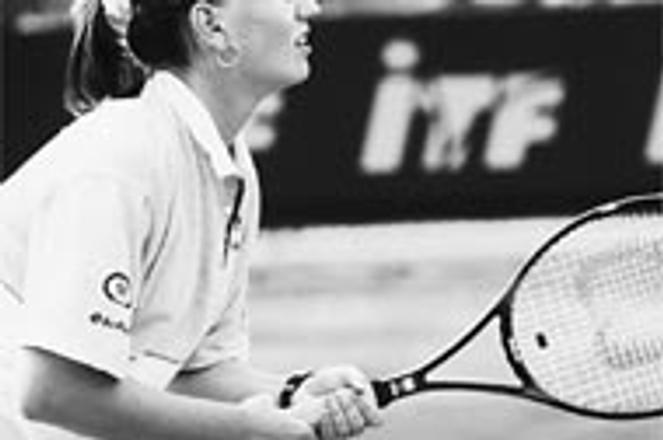"Playing in the Summer Olympics "is something very special. It's something for the country."
Karina Habšudová
Peter Pospíšil
When she was fourth among Czechoslovak female tennis players in 1992, when only the top three could go to the Barcelona Olympics, 18-year-old Karina Habšudová didn't sulk. "I was still pretty young," she says now. And when she reached the rank of 24th in the world in the spring of 1995, her far-sighted perspective seemed well justified.
But then things started to fall apart. Late last summer, she injured her left Achilles tendon and was almost unable to walk following the U.S. Open in September. Her ranking dropped all the way to number 98, where it stood until little more than a month before Olympic cuts would be made. Only players ranked in the top 65 were likely to make it. "I was pretty sad," she recalled recently.
But then she went on a roll. Habšudová made the semis of the Lipton Open in Key Biscayne, Florida, in March, and then in May, she beat 15-year-old Swiss phenom Martina Hingis and German Anke Huber on her way to the final of the Berlin Open, where she lost to top-ranked German Steffi Graf.
That was all a prelude to the French Open, where a healthy and hot Habšudová pulled off a couple more upsets. She beat 15th-seeded Hingis and 6th-seeded Huber each again en route to her first career Grand Slam quarterfinal appearance. There, she pushed 4th-seeded Aranxa Sanchez-Vicario to the limit in a three-hour match the Spaniard finally won 6:2, 6:7 (4:7), 10:8.
Habšudová was eliminated in the first round at Wimbeldon, where her countrywoman, 59th-ranked Katarína Studeníková, upset Monica Seles, but her wave of success has earned her the number 20 ranking in the world. In most people's minds, this removed any doubt she deserved to go to the Olympics this time.
"Karina has improved a lot recently," Graf said before a recent exhibition against Habšudová in Bratislava. "In the last few months, she has made more progress than anyone else in women's world tennis. She plays attractive, unbelievably fast tennis."
Habšudová is excited to apply her quick style to both singles and doubles competition in Atlanta for Slovakia's first independent Summer Olympic team. "It's something very special," she said in fluent English. "It's something for the country," contrasting it from the other 14 or so tournaments she plays each year. In those, she said, "you basically compete for yourself."
Although she is not young compared to the teenagers on the women's circuit, Habšudová's rise to the top ranks has been quick. A gymnast from age 5, she didn't start playing tennis until she was 10 and a half. But when her mother, who once played tennis in Slovakia's second league, had her start hitting balls on holidays in Karina's birth town of Bojnice, the little athlete took to it immediately.
"I felt I had an advantage [over peers] from gymnastics," she said. "I didn't have to find my coordination." But she preferred tennis over gymnastics for another reason. "I didn't like the judging in gymnastics," she said. "In tennis, there's always some bad calls, but you have to win yourself. It depends on what you do, not what somebody else does."
With her athletic ability and passion, Habšudová excelled at a rapid pace, turning professional at age 17, just six years after picking up the sport. Within a year, five months before she finished secondary school, she made the round of 16 at the 1991 Australian Open.
So after her career started with the momentum of an overhead smash, and then fell like a sinking lob, Karina Habšudová is rallying again. Considering she is now playing the best tennis of her life, she likes her chances in Atlanta. She said her goal is only "to get as far as possible," but then she quickly added, "of course, everyone likes to win."

